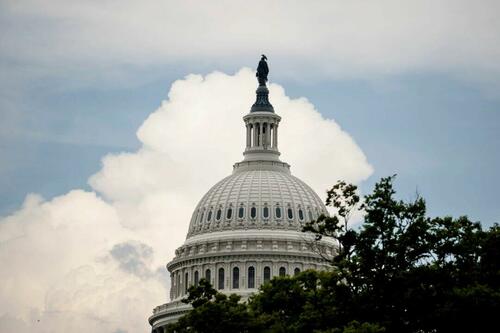Authored by Tom Ozimek via The Epoch Times (emphasis ours),
President Donald Trump’s $9 billion rescissions package, advanced by Senate Republicans in a narrow procedural vote on July 15, seeks to claw back funding that Congress had already approved for foreign aid, humanitarian programs, and public broadcasting.

Officially titled the Rescissions Act of 2025, the bill reflects the Trump administration’s effort to translate proposed Department of Government Efficiency cuts into law, aiming to reallocate billions of dollars toward domestic priorities. A final vote is needed by a Friday deadline, along with a second House vote on the Senate’s amendments.
Supporters have said the rescissions promote responsible spending and put U.S. interests first. Critics have said such cuts could undermine U.S. global leadership and disrupt programs that deliver important support both internationally and within local communities.
Here’s who could be affected if the bill becomes law.
US Taxpayers
Supporters have said that the measure promotes fiscal discipline and prioritizes domestic needs over foreign programs, cutting wasteful or needless spending at a time of record-high national debt.
“President Trump’s proposed rescissions are an essential piece to implementing his agenda to protect U.S. taxpayers and enact lasting change in Washington by dealing a major blow to the weaponized foreign aid bureaucracy and public funding of woke indoctrination at NPR and PBS,” Heritage Action Vice President of Government Relations Steve Chartan said in a statement.
Critics, including Senate Minority Leader Chuck Schumer (D-N.Y.), have argued that, among other things, it would reduce access to public media in the United States.
“For Republicans to turn around and slash local news and public radio in the name of fiscal responsibility is a vindictive swipe at rural America, where these stations are needed so badly,” Schumer said in floor remarks. “It’ll leave rural communities twisting in the wind.”
The bill proposes eliminating the entire $1.1 billion in advance funding set aside for fiscal years 2026 and 2027 for the Corporation for Public Broadcasting (CPB). That funding supports NPR, PBS, and about 1,500 local public radio and television stations nationwide.
Local stations use CPB grants to fund operations, emergency alerts, educational programming, and community news coverage. According to the Public Media Alliance, many of these stations—especially those in smaller markets—could lose significant portions of their budgets.
The advocacy group warned that cutting CPB funding could create “news deserts” in regions with limited commercial media options, leaving communities without local reporting on civic issues, elections, and public safety. Supporters of the cuts, like Jeffrey Miron of the think-tank Cato Institute, have said that with the internet, media subsidies are no longer needed.
Citizens of Other Countries
Developing nations stand to lose about $2.5 billion that would be rescinded from the $3.9 billion that Congress set aside for USAID’s development assistance in fiscal year 2025. These funds are aimed at reducing poverty and fostering democratic institutions.
Foreign communities that benefit from global health programs face a $500 million reduction, affecting initiatives aimed at combating diseases such as malaria and tuberculosis and improving maternal and child health.
Although the House’s original version of the bill proposed $900 million in health-related cuts, the Senate ultimately spared $400 million initially targeted for the U.S. President’s Emergency Plan for AIDS Relief. The program, which supports global HIV/AIDS prevention and treatment, has saved about 26 million lives, according to the agency. Critics have accused the agency of using some of the funds to promote anti-family agendas.
Refugees and displaced people worldwide could feel the effects of an $800 million cut to the State Department’s Migration and Refugee Assistance fund. The money is for emergency shelters, clean water, food, and family reunification for those fleeing war and persecution.
Regions grappling with ongoing conflicts could feel the effects of nearly $1 billion in cuts to U.S. contributions to international organizations and peacekeeping operations. Roughly $361 million would come from funding for international peacekeeping missions, and more than $638 million would be cut from broader multilateral efforts, including $437 million from the International Organizations and Programs account and $202 million from the Contributions to International Organizations account.
Government Employees
Within the federal government, the rescissions package would affect key agencies and their employees.
For example, the bill includes a $125 million cut to USAID’s $1.7 billion operating budget, which covers staff salaries and benefits.
This could lead to further layoffs or downsizing, as the Trump administration consolidates many of its functions into the State Department.
Critics have said the move may weaken USAID’s specialized development expertise, and supporters have said that it will enable better oversight.
Loading…

















